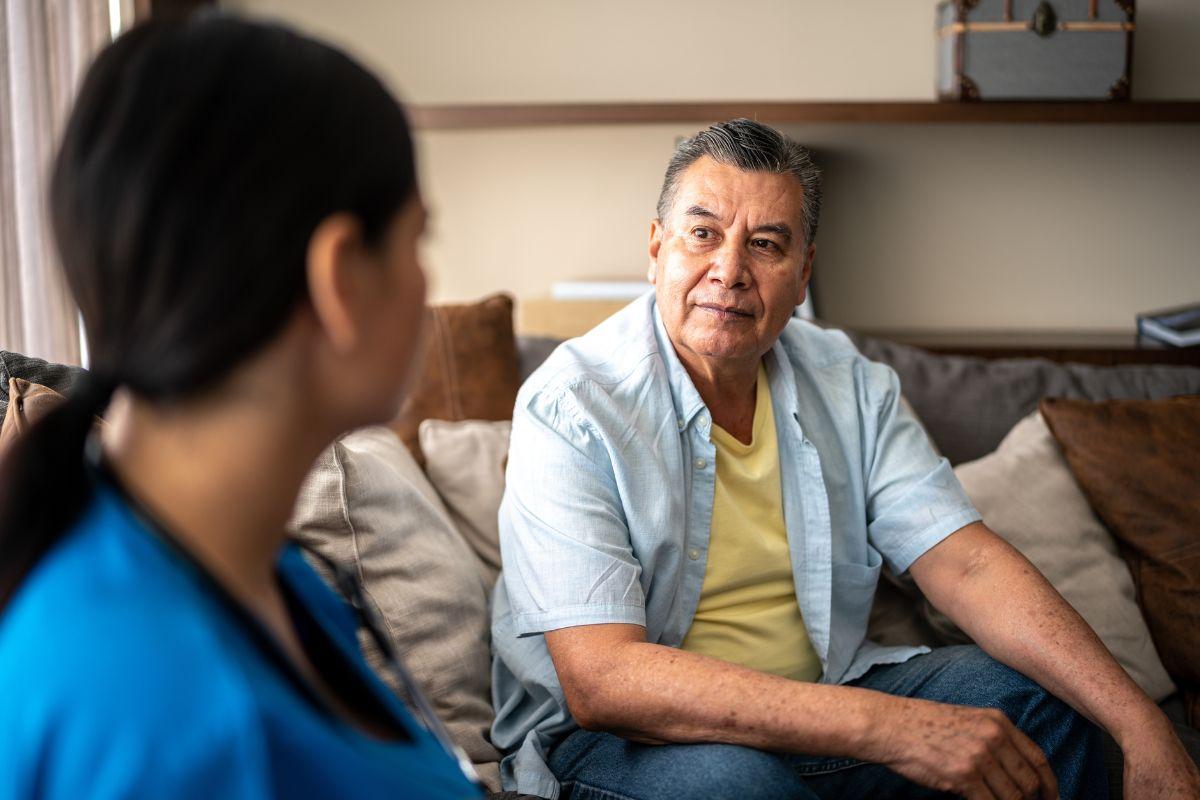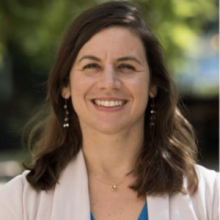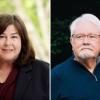
Strengthening Patient Care for Our Aging Population
With the number of Americans age 65 and older projected to increase by nearly 50% by 2050, UCSF School of Nursing students are heeding the call for a workforce prepared to provide high quality care to our growing older adult population. They are engaging in a collaboration between UCSF assistant professor Jim Gatewood, PhD, RN, AGNP, and SteppingStone, the largest provider of adult day health care in San Francisco.

Since 2018, more than 25 UCSF nurse practitioner students have worked at SteppingStone as registered nurses, honing their skills in conducting physical exams, taking vitals, managing chronic health conditions and more.
“SteppingStone provides an invaluable opportunity for our students to apply and solidify the core skills they are learning in their UCSF classes,” says Gatewood, who teaches in the school's Adult-Gerontology Primary Care Nurse Practitioner specialty.
Operating three centers in San Francisco, SteppingStone provides social programs and individualized health care for more than 350 older adults and adults living with disabilities, the majority of whom are from underserved communities. Participants visit the center two to five days per week for four-hour shifts, to receive care, nutritious food and participate in a variety of activities.
UCSF nursing students play a critical role in advancing SteppingStone’s goals to maintain participants’ independence, helping them stay mentally and physically active, and reducing feelings of isolation.
“The relationships that UCSF students have cultivated with our participants have been nothing short of transformative,” says Diana Almanza, director of services and outreach at SteppingStone. In addition to attending to participants’ physical health needs, Almanza says that UCSF students’ emphasis on the importance of participant voice in their own health care has nurtured a culture of mutual respect and understanding within the organization.
Cari Perumal, MS '24, RN, FNP, an alumna of the school’s Family Nurse Practitioner specialty, says her time working at SteppingStone has helped her understand the real-life impact of the interventions she recommends to patients. “It's a privilege to have time to facilitate trust and agency for our SteppingStone community to advocate for their needs and support them in doing so.”

Dementia Care Aware
There are 6.9 million Americans living with Alzheimer’s disease, a degenerative brain disease and the most common form of dementia. That number is expected to double by 2050. Early detection of cognitive decline is key to caring for patients with dementia; the sooner cognitive decline is diagnosed, the sooner a patient can receive care to slow progression.
But many patients remain undiagnosed until their symptoms have severely progressed. This is especially true for racially and ethnically diverse patients who are more likely to experience a missed or delayed dementia diagnosis than white patients.

“Addressing these disparities and improving access to early detection for dementia is critical to caring for older adults and their families,” says Ashley Johnson, DNP ’22, MS ’20, AGPCNP-C, an alumna of the school's Post-Master's Entry to the Doctor of Nursing Practice pathway.
Johnson leads an early detection program for Dementia Care Aware, a training and support initiative led by UCSF and the California Department of Health Care Services. The state-wide program offers information and tools to empower primary care providers across California to conduct cognitive health assessments and design appropriate care plans for patients.
Johnson and her team are pursuing an ambitious goal: perform 8,000 cognitive assessments on patients 65 or older across four clinics within the San Francisco Health Network. Patients are primarily from underrepresented groups and assessments are conducted over the phone to mitigate barriers to care.
If an individual demonstrates signs of cognitive decline during the assessment, Johnson and her team alert the patient's primary care provider and supply resources and training for additional evaluations.
Equipping primary care providers with tools to design appropriate care plans, engaging social workers to help patients and their families navigate community resources, and connecting patients with specialists are just some of the supports Johnson says she facilitates.
"Early detection of cognitive decline coupled with interprofessional collaboration and communication is critical to slowing the progression of dementia and effectively caring for our aging population,” she says.
Reimagining Hospice Care
The hospice care model was originally designed for patients with cancer who are expected to die within six months. However, almost half of patients enrolled in hospice in the United States today have Alzheimer’s disease or other dementias — conditions with prognoses that are uncertain.
Most Americans access hospice through Medicare hospice benefits which stipulate that the patient have a terminal illness with an expected prognosis of less than six months.
A new study led by Lauren Hunt, PhD '18, RN, FNP, assocuate professor, is exploring how recent policy changes in how Medicare pays for hospice impacts the cost and quality of care for hospice patients with dementia.

Hunt’s research is driven by her clinical experience as a hospice nurse. Many of her patients with dementia benefitted from the care they received in hospice but would ultimately be disenrolled because they were not showing continued evidence of decline. “Disenrollment is a difficult care transition for patients as they suddenly lose the supports hospice provides,” shares Hunt.
Additionally, there is evidence that the hospice industry is selectively enrolling patients who have an uncertain prognosis to receive more Medicare reimbursements for the patients’ longer stay.
Hunt’s five-year study, funded by the National Institute on Aging, will explore how Medicare policies to increase hospice audits and disincentivize long hospice stays impacted the frequency by which people with dementia were disenrolled and for what reasons.
“The large proportion of patients with dementia receiving hospice care demands that we reimagine care delivery,” says Hunt. “We must design hospice and palliative care models that respond to the unique needs of these patients.”



